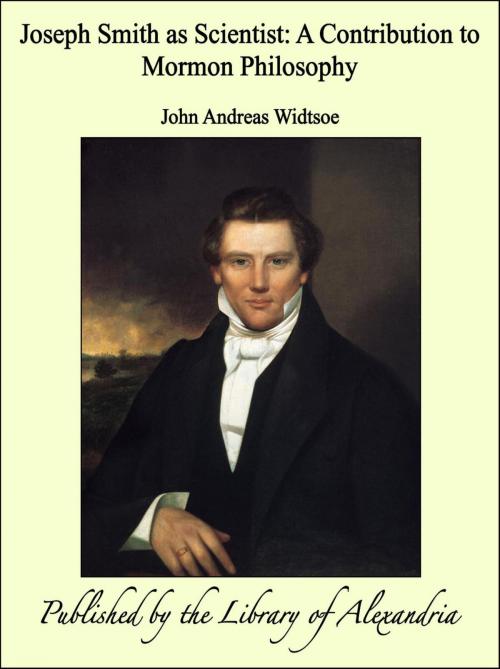Joseph Smith as Scientist: A Contribution to Mormon Philosophy
Nonfiction, Religion & Spirituality, New Age, History, Fiction & Literature| Author: | John Andreas Widtsoe | ISBN: | 9781465562494 |
| Publisher: | Library of Alexandria | Publication: | July 29, 2009 |
| Imprint: | Library of Alexandria | Language: | English |
| Author: | John Andreas Widtsoe |
| ISBN: | 9781465562494 |
| Publisher: | Library of Alexandria |
| Publication: | July 29, 2009 |
| Imprint: | Library of Alexandria |
| Language: | English |
In the life of every person, who receives a higher education, in or out of schools, there is a time when there seems to be opposition between science and religion; between man-made and God-made knowledge. The struggle for reconciliation between the contending forces is not an easy one. It cuts deep into the soul and usually leaves scars that ache while life endures. There are thousands of young people in the Church to-day, and hundreds of thousands throughout the world, who are struggling to set themselves right with the God above and the world about them. It is for these young people, primarily, that the following chapters have been written. This volume is based on the conviction that there is no real difference between science and religion. The great, fundamental laws of the Universe are foundation stones in religion as well as in science. The principle that matter is indestructible belongs as much to theology as to geology. The theology which rests upon the few basic laws of nature is unshakable; and the great theology of the future will be such a one. "Mormonism" teaches and has taught from the beginning that all knowledge must be included in the true theology. Because of its comprehensive philosophy, "Mormonism" will survive all religious disturbances and become the system of religious faith which all men may accept without yielding the least part of the knowledge of nature as discovered in the laboratories or in the fields. The splendid conceptions of "Mormonism" concerning man and nature, and man's place in nature are among the strongest testimonies of the divine nature of the work founded by Joseph Smith, the Prophet. This little volume does not pretend to be a complete treatment of "Mormon" philosophy; it is only a small contribution to the subject. There is room for elaboration and extension in this field for many generations to come. The attempt has been made to sketch, briefly, the relation of "Mormonism" to some features of modern scientific philosophy, and to show that not only do "Mormonism" and science harmonize; but that "Mormonism" is abreast of the most modern of the established views of science, and that it has held them many years—in some cases before science adopted them. The only excuse for the scant treatment of such an important subject is that it is as extensive as the duties of a busy life would allow. In the future, the subject may be given a fuller treatment
In the life of every person, who receives a higher education, in or out of schools, there is a time when there seems to be opposition between science and religion; between man-made and God-made knowledge. The struggle for reconciliation between the contending forces is not an easy one. It cuts deep into the soul and usually leaves scars that ache while life endures. There are thousands of young people in the Church to-day, and hundreds of thousands throughout the world, who are struggling to set themselves right with the God above and the world about them. It is for these young people, primarily, that the following chapters have been written. This volume is based on the conviction that there is no real difference between science and religion. The great, fundamental laws of the Universe are foundation stones in religion as well as in science. The principle that matter is indestructible belongs as much to theology as to geology. The theology which rests upon the few basic laws of nature is unshakable; and the great theology of the future will be such a one. "Mormonism" teaches and has taught from the beginning that all knowledge must be included in the true theology. Because of its comprehensive philosophy, "Mormonism" will survive all religious disturbances and become the system of religious faith which all men may accept without yielding the least part of the knowledge of nature as discovered in the laboratories or in the fields. The splendid conceptions of "Mormonism" concerning man and nature, and man's place in nature are among the strongest testimonies of the divine nature of the work founded by Joseph Smith, the Prophet. This little volume does not pretend to be a complete treatment of "Mormon" philosophy; it is only a small contribution to the subject. There is room for elaboration and extension in this field for many generations to come. The attempt has been made to sketch, briefly, the relation of "Mormonism" to some features of modern scientific philosophy, and to show that not only do "Mormonism" and science harmonize; but that "Mormonism" is abreast of the most modern of the established views of science, and that it has held them many years—in some cases before science adopted them. The only excuse for the scant treatment of such an important subject is that it is as extensive as the duties of a busy life would allow. In the future, the subject may be given a fuller treatment















